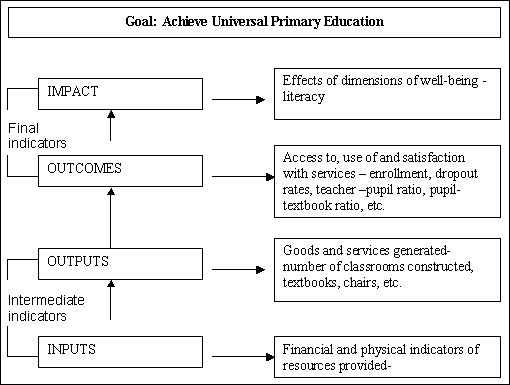
|
|
|
Monitoring the implementation of the PRSP: the Uganda experience
|
|
| 4. Process of the monitoring exercise |
| |
In 1999 UDN started participating in monitoring the implementation of PAF on behalf of civil society. Researchers were hired to carry out the monitoring. These researchers underwent training in participatory monitoring methodologies to enable them carry out the monitoring exercise effectively. Monitoring exercise was done quarterly meaning that these researchers would go back to the districts every quarter.
However, in May 2000, it was realized that there was need to keep track of how resources were being used both at district and local levels. This called for the establishment of locally established committees at the district level formed from amongst the beneficiaries of the PAF. This was an empowerment process that would foster ownership of the monitoring process by the members of the civil society and the grassroots people in general.
PAF Monitoring Committees (PMCs) at district level
These committees are composed of between 9- 11 members of the civil society representing NGOs, CSOs, and Community Based Organizations (CBOs), and religious organizations. Interest groups such as the women, youth, the elderly and the Persons with Disabilities (PWDs) also formed part of the committees.
Representation of the various sub counties in the district was also emphasized during the formation of these committees. This representation would increase coverage at the district level for their strategic meetings to enhance their monitoring exercises and meetings.
Skills development Training
In order to build the capacity of the PMCs in carrying out this noble activity, UDN organized quarterly training workshops intended to provide these people with basic skills in participatory monitoring, and lobby and advocacy. These skills were relevant for their participation in policy formulation and monitoring of government programmes particularly those that are geared towards poverty reduction and promoting good governance.
Apart from skills development through workshops, UDN through its Public Information Centre reviews and repackages information and disseminates it to these PMCS to enhance their understanding of different aspects of poverty and how they can participate in mitigating the situation.
Monitoring by the district PAF Committees
Equipped with the knowledge and skills, the PMCs then carry periodic monitoring of the implementation of the PAF as well as disseminating PAF information in their areas of jurisdiction. These activities of the PMCs have increased ownership of the PAF programme at the grassroots level and this safeguards against improper utilization of the funds.
Levels of Monitoring by the PMCs (e.g. in Primary Education)

|
|






